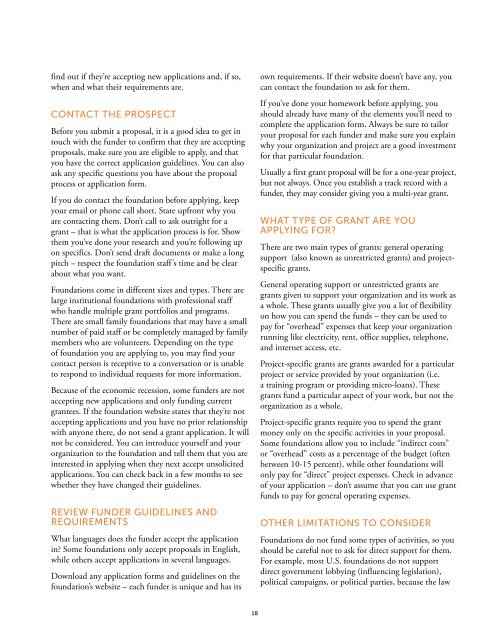ziI7w
ziI7w
ziI7w
Create successful ePaper yourself
Turn your PDF publications into a flip-book with our unique Google optimized e-Paper software.
find out if they’re accepting new applications and, if so,<br />
when and what their requirements are.<br />
CONTACT THE PROSPECT<br />
Before you submit a proposal, it is a good idea to get in<br />
touch with the funder to confirm that they are accepting<br />
proposals, make sure you are eligible to apply, and that<br />
you have the correct application guidelines. You can also<br />
ask any specific questions you have about the proposal<br />
process or application form.<br />
If you do contact the foundation before applying, keep<br />
your email or phone call short. State upfront why you<br />
are contacting them. Don’t call to ask outright for a<br />
grant – that is what the application process is for. Show<br />
them you’ve done your research and you’re following up<br />
on specifics. Don’t send draft documents or make a long<br />
pitch – respect the foundation staff’s time and be clear<br />
about what you want.<br />
Foundations come in different sizes and types. There are<br />
large institutional foundations with professional staff<br />
who handle multiple grant portfolios and programs.<br />
There are small family foundations that may have a small<br />
number of paid staff or be completely managed by family<br />
members who are volunteers. Depending on the type<br />
of foundation you are applying to, you may find your<br />
contact person is receptive to a conversation or is unable<br />
to respond to individual requests for more information.<br />
Because of the economic recession, some funders are not<br />
accepting new applications and only funding current<br />
grantees. If the foundation website states that they’re not<br />
accepting applications and you have no prior relationship<br />
with anyone there, do not send a grant application. It will<br />
not be considered. You can introduce yourself and your<br />
organization to the foundation and tell them that you are<br />
interested in applying when they next accept unsolicited<br />
applications. You can check back in a few months to see<br />
whether they have changed their guidelines.<br />
REVIEW FUNDER GUIDELINES AND<br />
REQUIREMENTS<br />
What languages does the funder accept the application<br />
in? Some foundations only accept proposals in English,<br />
while others accept applications in several languages.<br />
Download any application forms and guidelines on the<br />
foundation’s website – each funder is unique and has its<br />
own requirements. If their website doesn’t have any, you<br />
can contact the foundation to ask for them.<br />
If you’ve done your homework before applying, you<br />
should already have many of the elements you’ll need to<br />
complete the application form. Always be sure to tailor<br />
your proposal for each funder and make sure you explain<br />
why your organization and project are a good investment<br />
for that particular foundation.<br />
Usually a first grant proposal will be for a one-year project,<br />
but not always. Once you establish a track record with a<br />
funder, they may consider giving you a multi-year grant.<br />
WHAT TYPE OF GRANT ARE YOU<br />
APPLYING FOR?<br />
There are two main types of grants: general operating<br />
support (also known as unrestricted grants) and projectspecific<br />
grants.<br />
General operating support or unrestricted grants are<br />
grants given to support your organization and its work as<br />
a whole. These grants usually give you a lot of flexibility<br />
on how you can spend the funds – they can be used to<br />
pay for “overhead” expenses that keep your organization<br />
running like electricity, rent, office supplies, telephone,<br />
and internet access, etc.<br />
Project-specific grants are grants awarded for a particular<br />
project or service provided by your organization (i.e.<br />
a training program or providing micro-loans). These<br />
grants fund a particular aspect of your work, but not the<br />
organization as a whole.<br />
Project-specific grants require you to spend the grant<br />
money only on the specific activities in your proposal.<br />
Some foundations allow you to include “indirect costs”<br />
or “overhead” costs as a percentage of the budget (often<br />
between 10-15 percent), while other foundations will<br />
only pay for “direct” project expenses. Check in advance<br />
of your application – don’t assume that you can use grant<br />
funds to pay for general operating expenses.<br />
OTHER LIMITATIONS TO CONSIDER<br />
Foundations do not fund some types of activities, so you<br />
should be careful not to ask for direct support for them.<br />
For example, most U.S. foundations do not support<br />
direct government lobbying (influencing legislation),<br />
political campaigns, or political parties, because the law<br />
18




